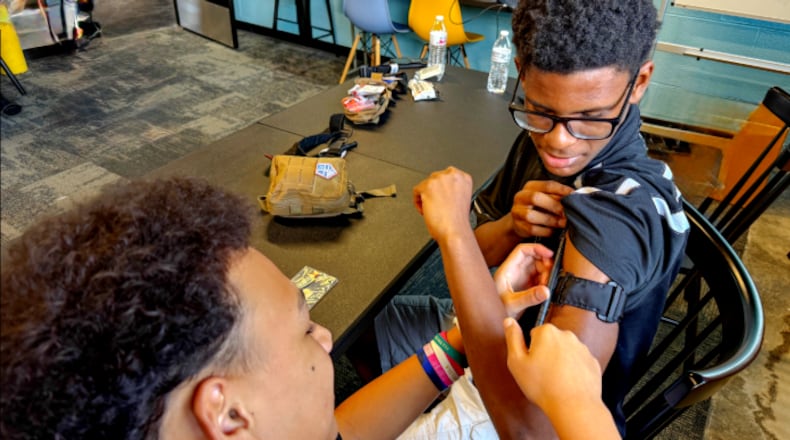As I learned more about this training, I realized the critical need to offer it to our young men. The reality is that they are significantly more likely to be near a victim of violence in their neighborhoods than in their schools.
When assessing community violence, many people focus solely on homicide rates, which only provide part of the picture. The FBI and other federal agencies consider aggravated assaults a more accurate indicator of violence, especially when analyzing trends over time. Aggravated assault involves the use of deadly force, which can lead to severe injury or death if not treated promptly. With medical advancements, murder rates may decline; however, tracking aggravated assaults still reveals ongoing patterns of violence, making it a key indicator.
“For the first six months of 2025, Dayton has had a total of four days without an aggravated assault‚” said Dayton Police Chief Kamran Afzal at the July Chief’s Advisory Council.
This is the environment in which our youth live, attend school, and socialize. While unacceptable, it is a harsh reality. Although this TACMED course is new to the Victory Project, its purpose aligns with our core approach. We emphasize that in life, we can control three main aspects:
- Positive attitude
- Honest effort
- Consistency
This is particularly important for adolescents, who often cannot control their home, neighborhood, or school environments. However, they can control how they respond to their circumstances. As they grow older, their influence over external factors may not change significantly, but embracing these three principles will serve them well throughout their lives.
What does this look like in practice?
Young men growing up in government housing are becoming homeowners. They are taking on the responsibilities of being husbands and fathers, even if they didn’t have positive role models themselves. Some are serving as police officers in the same violent communities where they were raised, while others are pursuing careers that allow them to make choices that improve their families’ quality of life, opening opportunities they never had.
The TACMED course embodies the VP’s philosophy by preparing our members to “find a way,” even when it seems impossible, empowering them to actively engage with the world around them and become assets, even in the unacceptable conditions we face today.
Lasting trauma
Editor’s Note: The name’s of the youth below have been changed for their safety.
At age 12, Darren was like many youths: not a fan of school, often with too much time on his hands, wandering the neighborhood, where he connected with another young man who shared the same tendency. Darren and Isaiah, 14, quickly became close friends.
Best friends, Darren says today. One summer evening a few years ago, the friends were walking through their neighborhood when another teenager approached. Darren acknowledges that Isaiah was involved in minor criminal activity, which is why the person targeted Isaiah. Suddenly, the third individual produced a gun and shot Isaiah in the chest before fleeing. Up to that point in Darren’s life, he had already been exposed to fights and other forms of violence. Now his best friend lay on the ground, shot. Darren recalls the moment: “I ran over to Isaiah; he was semiconscious and bleeding from the chest, which made a wet, sucking sound. I called 911.
”After the ambulance arrived, Darren watched the paramedics attempt to save his friend’s life. He rode to the hospital with Isaiah, holding his hand, and witnessed the heart-rate monitor flatline. His first thought was, ‘Who will tell Isaiah’s mom?’ This event contributed to Darren’s path of brokenness and undiagnosed trauma. He continued down a self-destructive route, eventually living in group homes.
Five years later, Darren became a member of the Victory Project (VP), where he found a healthy network of friends and mentors and emerged as a leader among his peers. However, doing the right thing hasn’t stopped crime and violence from affecting young men like Darren.
Recently, while walking home from VP in West Dayton, he and another friend were approached by a car; its occupants pulled guns, demanding their backpacks. Both fled unharmed. When asked about the first thought after the attempted robbery, Darren said he did not want to “become another statistic.”
A few days later, Darren and other VP members were cutting grass for a customer when a car pulled up, and a man jumped out, grabbing equipment from the trailer and shouting, “Street Squad Ni**as” before speeding away.
In discussing youth access to firearms, Darren noted that he had known teens as young as 15 who carried guns regularly. When asked how quickly he could obtain a firearm if given money, he answered, “By the end of the day.”
About the Author

